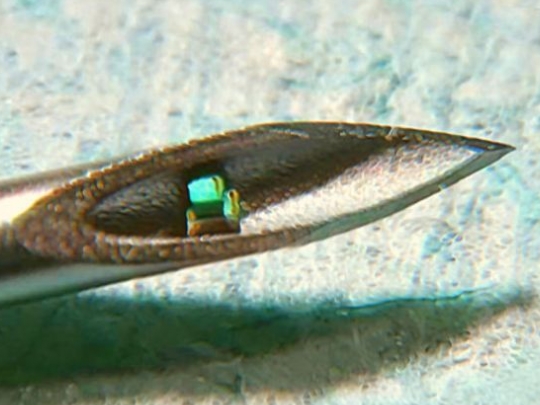The Smallest-Ever Injectable Chip Hints at a New Cybernetic Medicine

Electronics are getting imperceptibly small, opening new avenues for medical technology to place advanced monitoring and treatment devices inside our bodies. And Columbia University engineers just demonstrated a new and revolutionary version of this, creating the world's smallest single-chip system ever developed, according to a recent study published in the journal Science Advances.
And, critically, the tiny new chip can be implanted via a hypodermic needle to measure internal body temperature, and potentially much more.
A tiny computer chip was implanted into seven mice at once
The implant created by the engineers at Columbia is record-breakingly small, but it's also breaking new ground in simply existing as a wholly functional, electronic circuit whose total volume is less than 0.1 cubic millimeter. In other words, it's the size of a dust mite, not to mention far more compact than the world's smallest computer, which is a cube-shaped device precisely 0.01-inches (0.3 mm) on each side. The smaller, new chip is only visible with a microscope, and pushed the envelope in power-sourcing and communications ingenuity design.
Typically, small electronics feature radio frequency (RF) modules capable of transmitting and receiving electromagnetic signals, this method generates wavelengths too large to originate from devices as small as the new one. Alternatively, ultrasound wavelengths are far smaller at specific frequencies because the speed of sound is a lot slower than the speed of light at which all electromagnetic waves move. Consequently, the Colombia team of engineers integrated a piezoelectric transducer capable of functioning like an "antenna" for wireless communication and powering using ultrasound waves.
When incorporated with a low-power temperature sensor to transform the chip into a real-time temperature probe, the device possesses the ability to monitor body temperature in addition to small variations in temperature linked to the therapeutic use of ultrasound. In the study, the implant's proof-of-concept was carried out on live mice, in which it employed ultrasound neurostimulation. This involved implanting up to seven mice at once with intramuscular injection via syringe.
The injectable chip could serve as an 'early warning' system against future outbreaks
Such tiny chips could also be implanted in the human body, and then communicate measured information and data wirelessly through ultrasound. As the device stands, it can only measure body temperature, but it could eventually also monitor respiratory function, glucose levels, and blood pressure. "We wanted to see how far we could push the limits on how small a functioning chip we could make," said Ken Shepard, leader of the Columbia study, in a report from New Atlas. "This is a new idea of 'chip as system' — this is a chip that alone, with nothing else, is a complete functioning electronic system."
"This should be revolutionary for developing wireless, miniaturized implantable medical devices that can sense different things, be used in clinical applications, and eventually approved for human use," added Shepard. In a post-coronavirus world, it's not difficult to see the immediate benefits of mass injections of benign devices capable of monitoring your temperature. One day, something like this could be an early warning system to officials of a brewing pandemic. And while the tiny computer chip is still in its earliest stages, there's much more to expect as medical technology begins to push into tomorrow's cybernetics.
- Source : Brad Bergan


















